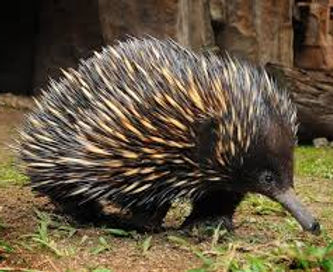Biological Adaptations
Taylah Rich 11MKL

Short-Beaked Echidna
The short-beaked echidna (Tachyglossus aculeatus) is one of four species of echidna.
The species is covered in fur and spines and has a unique snout and specialised tongue used to catch its prey. The short-beaked echidna, like other monotremes lays eggs.
The species is a found throughout Australia and is Australia’s most widespread native mammal.
Figure 1: Short-Beaked Echidna

Duck-Billed Platypus
The platypus (Ornithorhynchus anatinus) is also known as the duck-billed platypus.
The platypus is a semi-aquatic egg-laying mammal. Together with the echidna, the platypus is one of the only mammals that lay eggs rather than giving birth. The duck-billed platypus has a very unique appearance including a large duckbill, beaver like tail and otter shaped feet. The platypus is also covered in dense waterproof fur.
The species can be found in eastern Australia and Tasmania.
Figure 2: Duck-Billed Platypus

Eucalyptus Regnans (Mountain Ash)
Eucalyptus Regnans, also commonly known as Mountain Ash, Swamp Gum or Stringy Gum, are a species of Eucalyptus.
The species is the tallest flowering plant and one of the tallest trees in the world. The trees regularly grows to reach 85 metres tall. Eucalyptus Regnans regenerate from seeds when acted upon by a fire and have a lifespan of several hundred years.
The species is native to Victoria and Tasmania.
Figure 3: Eucalyptus Regnans